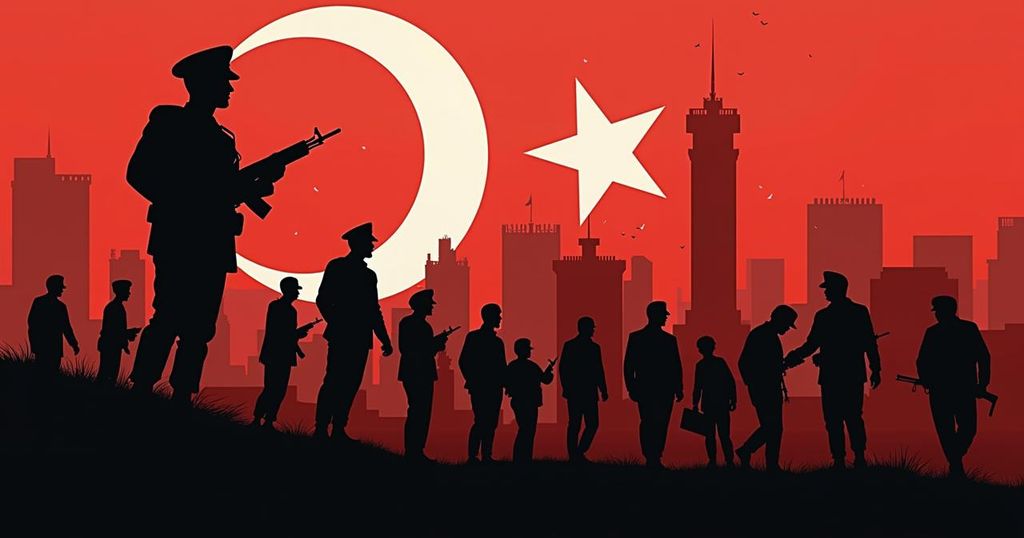The Tunisian army’s growing influence in politics has raised alarms ahead of the presidential election, particularly following President Kais Saied’s consolidation of power since 2019. While historically marginalized, the military’s role has expanded under Saied, who has appointed military officials to key government positions. This development is concerning as Tunisia faces accusations of an unfair electoral process, prompting questions about the military’s potential impact on democracy.
In recent years, the role of the Tunisian army in the realm of politics has attracted considerable attention, particularly in light of the upcoming presidential election. Historically, the Tunisian military has been relatively disengaged from political affairs, especially during the tenures of Presidents Habib Bourguiba and Zine el-Abidine Ben Ali, when military influence was largely diminished. However, the political landscape shifted following the 2011 revolution, which portrayed the army as a protector of democracy. The ascent of President Kais Saied in 2019 marked a significant change as he actively sought to cultivate support from the military, a strategy that facilitated his consolidation of power during the controversial events of July 2021. Under President Saied’s leadership, the military has been increasingly integrated into governance. A notable historical milestone occurred with the appointment of high-ranking military officials to ministerial positions, signifying an unprecedented level of military involvement in politics. Such actions have raised concerns among observers regarding the implications for democracy and civil liberties before a presidential election characterized by allegations of unfairness. Unlike many of its regional counterparts, the Tunisian military has traditionally remained apolitical and was initially kept away from governance by Bourguiba, who emphasized a civilian-led state. Yet, the armed forces gained public favor in the aftermath of the 2011 revolution, where they were heralded for their refusal to suppress civilian protests against Ben Ali. In subsequent years, the army has expanded its role, including organizing elections and maintaining public order amid security threats from extremist attacks. Now, as Saied’s administration faces criticism over its governance and limitations on political opposition, the military’s growing influence poses significant questions. Saied has utilized military support to clamp down on dissent, raising fears about the long-term effects on Tunisia’s democratic framework. Political analysts observe that while military support has solidified Saied’s power, potential friction exists, particularly concerning policy disagreements between military leaders and the president himself. This tension highlights the complex dynamics currently shaping the relationship between Tunisia’s military and its political future, especially in the context of the forthcoming presidential election.
The political evolution of the Tunisian military serves as a distinct narrative following the country’s independence in 1956. Under the leadership of Habib Bourguiba, there was a concerted effort to limit military involvement in governance, influenced by a preference for a democratic structure akin to the French model. The marginalization of the military continued under Ben Ali, culminating in confrontations such as the Barraket Essahel case, where the military was viewed with suspicion. However, the 2011 revolution catalyzed a transformation, where the army’s image shifted from being a potential threat to a defender of democratic principles. In recent years, particularly under President Kais Saied, this dynamic has evolved once again, with military personnel being directly incorporated into political roles, prompting a reevaluation of their function within the state and its democratic structure.
In conclusion, the increasing involvement of the Tunisian army in politics under President Kais Saied raises substantial concerns regarding the preservation of democratic values in the country. The historical context of military marginalization and the abrupt shifts following the 2011 revolution underscore the unique trajectory of Tunisia’s political landscape. As the country approaches a pivotal presidential election, the complexities of military influence necessitate scrutiny, particularly given the potential implications for civil liberties and the democratic process. The delicate balance of power between Saied and the military will be critical in determining Tunisia’s future as it navigates significant political challenges.
Original Source: www.middleeasteye.net






